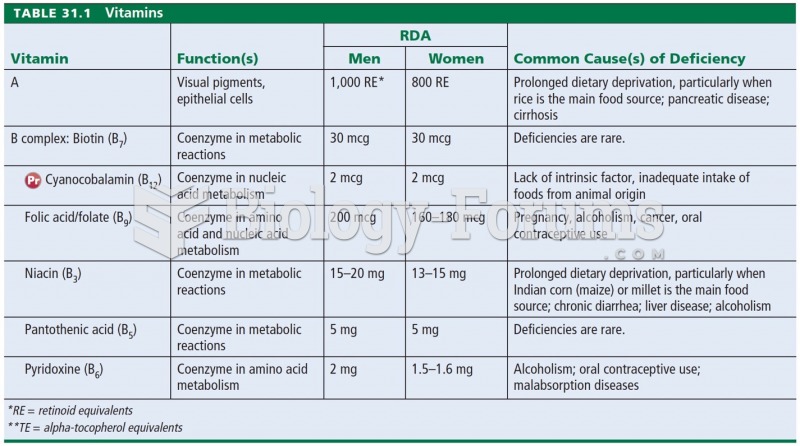Answer to Question 1
1, 3
Rationale 1: Provitamins must be supplied in the diet.
Rationale 2: Vitamins serve diverse and important roles in human physiologyfor example, as co-enzymes for metabolic pathways, precursors for retinal, and assisting with blood clotting.
Rationale 3: If the vitamin is not present in adequate amounts, the body's metabolism will be disrupted, and disease will result.
Rationale 4:Human cells cannot synthesize vitamins with the exception of vitamin D.
Rationale 5: Vitamins can cause adverse reactions. They should only be taken as directed.
Global Rationale: Human cells cannot synthesize vitamins with the exception of vitamin D. Provitamins must be supplied in the diet. If the vitamin is not present in adequate amounts, the body's metabolism will be disrupted, and disease will result. Vitamins serve diverse and important roles in human physiologyfor example, as co-enzymes for metabolic pathways, precursors for retinal, and assisting with blood clotting.
Answer to Question 2
1
Rationale 1: The body is only able to synthesize vitamin D.
Rationale 2:The symptoms of the deficiency can be reversed by the administration of the missing vitamin.
Rationale 3:If the vitamin is not present in adequate amounts, the body's metabolism will be disrupted, and disease will result.
Rationale 4: They or their precursorsknown as provitaminsmust be supplied in the diet. A second important characteristic is that if the vitamin is not present in adequate amounts, the body's metabolism will be disrupted, and disease will result.
Global Rationale: The body is only able to synthesize vitamin D. An important characteristic of vitamins is that, with the exception of vitamin D, human cells cannot synthesize them. They or their precursorsknown as provitaminsmust be supplied in the diet. A second important characteristic is that if the vitamin is not present in adequate amounts, the body's metabolism will be disrupted, and disease will result. Furthermore, the symptoms of the deficiency can be reversed by the administration of the missing vitamin.







